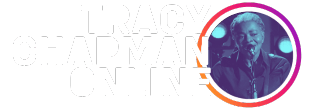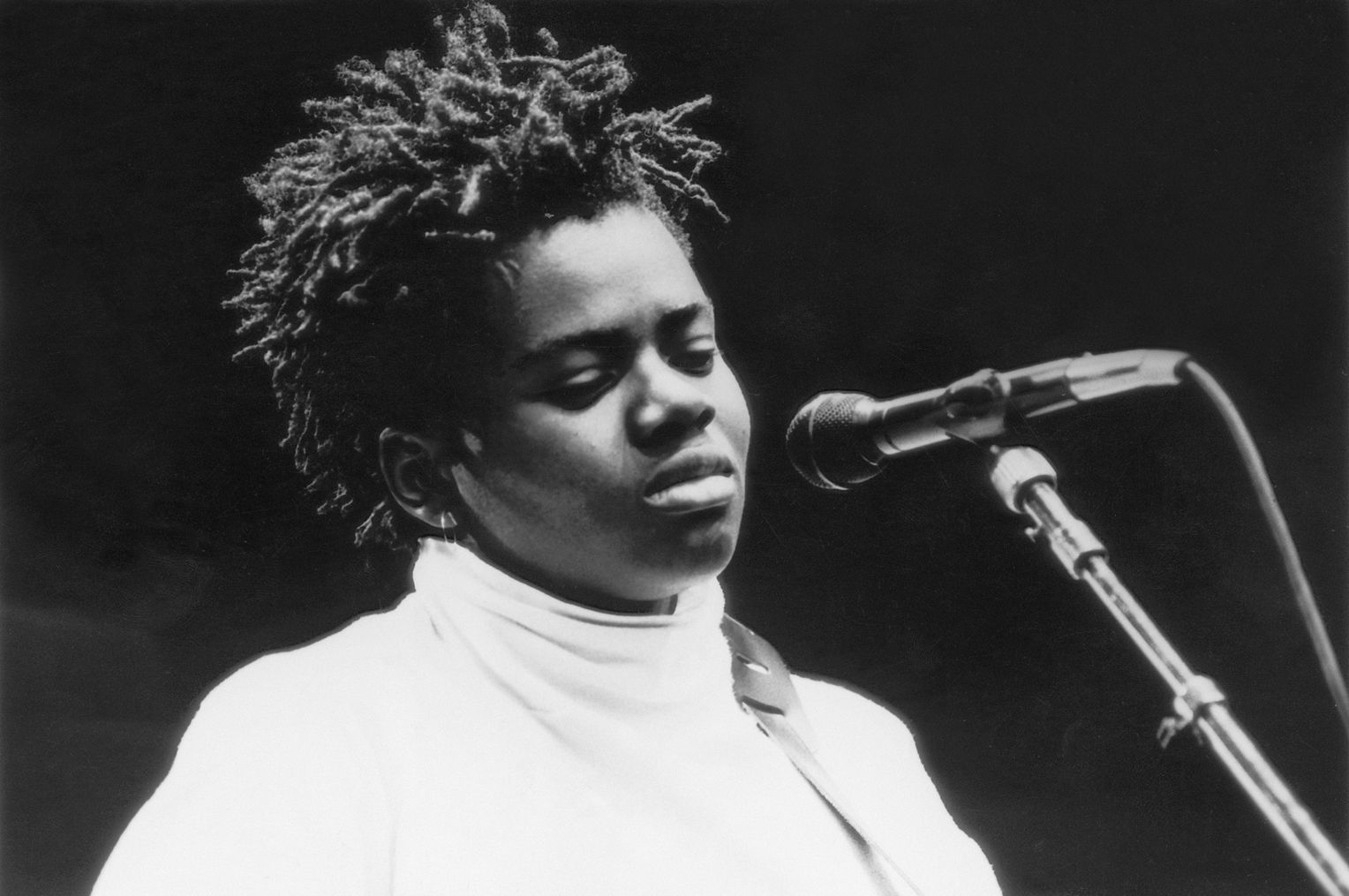A powerful new voice sings out about racism and poverty
By Anthony De Curtis, Rolling Stone #529 , June 30th, 1988 (p.44-46)
“The world’s a mess,” says Tracy Chapman, flashing a winning smile and then breaking into laugher. The twenty-four-year-old-singer-songwriter is well aware of her reputation for seriousness, and she has just stopped herself, nearly breathless, after railing against a catalog of social ills. Chapman, whose powerful debut album, Tracy Chapman, addresses such issues as racism and violence against women, is perfectly capable of laughing at herself. What she is not interested in doing is lightening up her music.
“I didn’t know that you had to have a percentage of humor on every album you put out“, she says, joking that perhaps her next record should be a “comedy album“. “I don’t know that you can necessarily be humorous about some of the issues that I deal with in my songs“, she continues. “I don’t know that it serves them very well to dilute things in that way.”
No need to worry – the eleven songs on Tracy Chapman are as undiluted as they could be. The production id subtle and streamlined, focused unyieldingly on Chapman’s acoustic guitar, her bluesy voice and her carefully wrought tales of characters in contemporary America seek meaning in the face of society’s fragmentation. Chapman is equally direct about her political beliefs : “Poor people gonna rise up/ And get their share/Poor people gonna rise up/And take what’s theirs”, she insists in the album’s opening track, Talkin’ bout A Revolution. Sentiments like these have led critics to view Chapman as a bridge between the Eighties folk revival and the more socially conscious folk movement of the Sixties.
That connection was dramatically underscored in early May, when Chapman performed two riveting sets at the Bitter End, on Bleecker Street in New York City’s Greenwich Village. Though it’s now primarily a showcase club for new, unsigned bands, the Bitter End was a hot spot on the Sixties folk scene, before Chapman was born. Playing alone on that legendary stage for an audience of writers and music bizzers stokes by the buzz her album had generated, Chapman made it clear that she was not easily intimidated. Dressed casually in jeans and a sleeveless light-blue top, she performed with poise, meeting the in crowd’s expectations while in no way pandering to them. Such independence is Tracy Chapman’s style.
The day after the Bitter Ends shows is rainy and uncharacteristically cool for a spring day in New York, and Chapman sits drinking tea in the hotel suite of her manager, Elliot Roberts, who also managed Joni Mitchell, is another tie between Chapman and a folk tradition that she acknowledges but doesn’t entirely regard as her own.
Asked if she sees herself as a folk singer, Chapman hesitates before responding. “I guess the answer’s yes and no,‘ she says, adjusting her compact, muscular body in a gray armchair. “I think what comes to people’s minds in the Anglo-American tradition of the folk singer, and they don’t even think about the black roots of folk music. So in that sense, no, I don’t. My influences and my background are different. In some ways, it’s a combination of the black and white folk traditions.”
Chapman grew up in a predominantly black working-class neighborhood in Cleveland and began playing music as a young child, taking clarinet lessons at school and playing the organ in her home. Her parents split up when she was four years old, and she lived with her mother and her older sister, Aneta, to whom Tracy Chapman is dedicated. “There was always lots of music in our house,” Chapman says, citing Betty Wright, Gladys Knight and the Pips, Marvin Gaye and the gospel singers Mahalia Jackson and Shirley Caesar as being among her mother’s favorites. “When I was growing up, I kind of tool it for granted. It was funny to go to others people’s houses and find they didn’t have records.” Chapman started writing songs when she was about eight, composing on the organ. “They were pretty terrible songs,” she admits, laughing, “about whatever eight-year-olds write about. You know, the sky…”
The environment in which Chapman grew up also taught her about more than music. “I was very aware of all the struggles my mother was going through, being a single parent and a black woman trying to raise two kids,” she says. “I guess there’s some people who can take all that in and not really look at the bigger picture, not see that there are all these forces in society making things more difficult than they ought to be.”
Chapman’s political awareness deepened when, through a minority-placement program called A Better Chance, she enrolled as a scholarship student at the Wooster School, a small, progressive private school in Danbury, Connecticut. “At that time, I met a mot of students, and also teachers, who were involved in political causes,” Chapman says. “A lot of the people who were teaching us were just a few years out of college and they were pretty aware. During my first year there was all this talk about the reinstatement of the draft, and people were really focused on that and the whole question of nuclear weapons. So I started to deal with some larger political issues, outside of where I had come from, what I had grown up seeing.”
In addition to getting her political education, Chapman played on the girls’ soccer, basketball and softball teams at Wooster. She also continued writing songs and regularly played at the school’s coffeehouse concerts. “She seemed to have a real good sense of herself musically, and that’s unusual for a high-school-age kid,” says David Douglas, who heads Wooster’s music program and who performed with Chapman several times. “Her influences showed – and perhaps still do – but she had a clear sense of who she was.”
In Chapman’s sophomore year, the school’s chaplain at the time, the Reverend Robert Tate, took up a collection among students and faculty members to buy her a new guitar – and he is thanked in the acknowledgments on Tracy Chapman. “We knew she would make it somehow, someway,” says Sid Rowell, Wooster’s dean of students, about Chapman. “The only question was when, because she wasn’t kind of kid who was going to compromise. She was going to have success on her own terms.”
In 1982, Chapman graduated from Wooster and went off to Tufts University, near Boston, where she initially planned to major in biology and then to pursue a career as a veterinarian. She soon grew dissatisfied with the premed program, however and eventually decided to major in anthropology, with special interest in West African cultures. “I wanted to study something that really interested me and in some way moved me,” Chapman says, “something where I felt I was really learning something that would give me some meaning to my life.”
Chapman soon became a force on the folk scene around Boston and Cambridge, performing at local clubs and colleges – as well as on the street in Harvard Square. “The first time I street-performed was in November, the night before Thanksgiving,” Chapman says with a rueful laugh. “Oh, God, it was crazy. I was hanging out with a friend of mine, and almost everybody else in the house we lived in had gone home for Thanksgiving. We didn’t have anything to do, and we didn’t have any money. I was playing my guitar, and she said, “Why not got in the square and play ?”
“So I did it. It was freezing. There were hardly any people out there. I made twenty or twenty-five dollars, and we went out and had some Chinese food! ”
One member of Chapman’s burgeoning audience was Brian Koppelman, is the K of SBK, one of the largest music-publishing and -production companies in the world. Brian urged his father to come hear Chapman perform. Koppelman was suitably impressed, and Chapman signed a deal with SBK after she graduated in 1986. The demo tape she made with SBK led to her signing with Elektra Records last year.
The whole process came as something of a surprise to Chapman. “I have to say that i never thought I would get a contract with a major label,” she says matter-of-factly. “All the time since I was a kid listening to records and the radio, I didn’t think there was any indication that record people would find the kind of music that I did marketable. Especially when i was singing songs like Talkin’bout a Revolution during the Seventies – you know, fit right in with the disco era. I didn’t see a place for me there.”
The breakthrough of Suzanne Vega with Luka, a song that addresses -somewhat delicately – the issue of child abuse, helped set the stage for Chapman’s emergence. Chapman’s album, however, presents a far more fundamental challenge to radio programmers – not to mention the middle-class sensibility of most pop-music fans. Fast Car, the album’s first single, describes a couple who spend some time in a homeless shelter, while Talkin’bout a Revolution speaks of people standing on “welfare line”. Such folk are clearly not the hormone-driven adolescents or romantic adventurers who typically populate the Top Forty.
What Chapman has going for her is the sheer musicality of her songs and the expressive power of her voice, which, despite her discomfort with the comparison, recalls Joan Armatrading’s in its richness and emotional range. And while all of Chapman’s songs are informed by her political songwriter. In the lovely Baby Can I Hold You she writes such moving simplicity about the pain of waiting for a commitment that never seems to come : “I love you/Is all that you can’t say/Years gone by and still/Words don’t come easily/Like I love you I love you.” For You, which closes the album, and If Not Now survey similar terrain.
More daring is the fierce, hypnotic For My Lover which explores love as a pieces of crime (“Two weeks in a Virginia jail/For my lover for my lover”) and madness (“Everyday I’m psychoanalyzed/For my lover for my lover/They dope me up and i tell them lies”.) The song’s knowingly offhand tag line – “The things we won’t do for love” – nearly suggests the submerged ties between such romantic clichés and genuinely damaging emotions.
For My Lover is perhaps the edgiest song on Tracy Chapman. Chapman opened both her shows at the Bitter End with it, and she sees connections between the obsessive love described in the song and the narcotic materialism she delineates in another track on the album, Mountains o’ Things.
“One thing that really concerns me is a sense of balance,” Chapman says. “You know, when you’re talking about material things, it’s where those things fit into your life. Then, with relationships, too, how do you position yourself in relation to other people ? It’s a fine line sometimes, trying to hold on to yourself and your own identity and either being lured into having other people define them for you or having the things around you define them for you.”
One reality that is in danger of defining Tracy Chapman at the moment is, ironically, her status as one of the most highly touted debut artists in America. She is at the difficult point where the white noise of hype might obscure the less sensational virtues of her songs, where unconsidered praise could quickly transform her from the next to the last big thing.
Chapman, however, is content to let her songs do their work. “I’m just hoping that people are discovering the record because they’re really finding something that means something to them,” she says. “My feeling is that it’s real – that the reason people are listening to my music and liking it is because they really do.“


